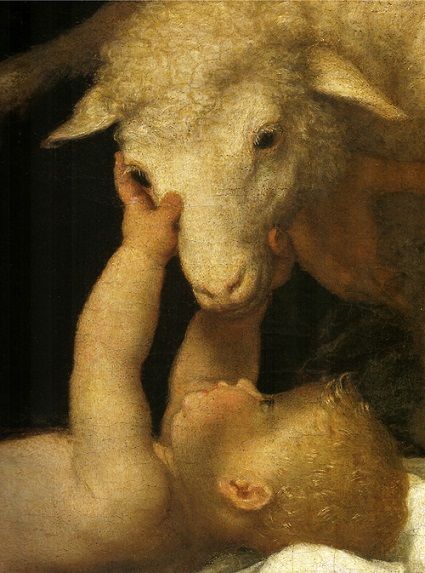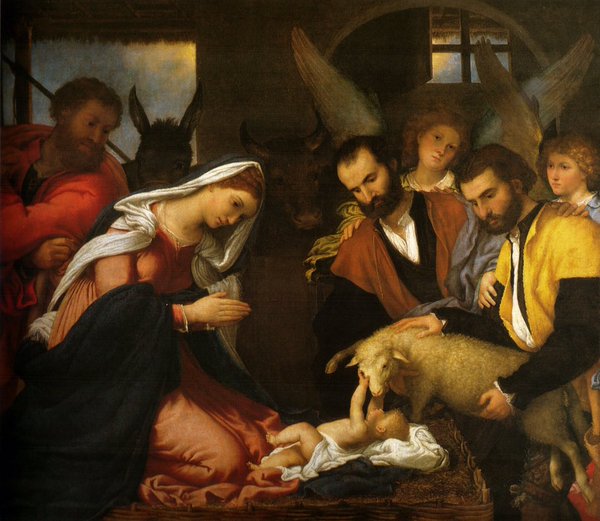December 30: His Mercy
♫ Music:
Day 28 - Saturday, December 30
Title: His Mercy
Scripture: Titus 3:4-7
But when the goodness and loving kindness of God our Savior appeared, he saved us, not because of works done by us in righteousness, but according to his own mercy, by the washing of regeneration and renewal of the Holy Spirit, whom he poured out on us richly through Jesus Christ our Savior, so that being justified by his grace we might become heirs according to the hope of eternal life.
Poetry:
From a Window
By Christian Wiman
Incurable and unbelieving
in any truth but the truth of grieving,
I saw a tree inside a tree
rise kaleidoscopically
as if the leaves had livelier ghosts.
I pressed my face as close
to the pane as I could get
to watch that fitful, fluent spirit
that seemed a single being undefined
or countless beings of one mind
haul its strange cohesion
beyond the limits of my vision
over the house heavenwards.
Of course I knew those leaves were birds.
Of course that old tree stood
exactly as it had and would
(but why should it seem fuller now?)
and though a man's mind might endow
even a tree with some excess
of life to which a man seems witness,
that life is not the life of men.
And that is where the joy came in.
HIS MERCY
Christmas is much more than our beloved traditions with family and friends. Pushing aside the cultural trappings of the Christmas celebration leaves us with the spiritual realities of the Incarnation, and a deep appreciation of the mercy of God.
In Titus 3:3, Paul describes what humankind is like before Christ: “For we ourselves were once foolish, disobedient, led astray, slaves to various passions and pleasures, passing our days in malice and envy, hated by others and hating one another.” These are ugly descriptions, and a quick glance at the news reveals that they still hold true today.
And yet, there is good news. Reread Titus 3:4-7. In a series of verses packed with meaning, pay attention to one key phrase: according to His own mercy. Today’s scripture reading overflows with doctrinal and practical wonder about the mercy of God, the work of the Trinity, and our hope for the future. According to His mercy, we are “heirs of God and fellow heirs with Christ” and “there is therefore now no condemnation for those who are in Christ Jesus.” (Romans 8:17, 8:1).
Lorenzo Lotto’s Adoration of the Shepherds features the traditional players of the nativity clustered around Christ. While the surrounding figures are bent in worship or wonder, Christ is looking intently at a lamb. He gently grasps its face with his chubby hands, as if to see it fully. In this, we can understand the larger point that Lotto is making here: Christ must also be understood as “... the Lamb of God, who takes away the sin of the world!” (John 1:29). According to the mercy of God, “the Word [Jesus] became flesh and dwelt among us, and we have seen his glory, glory as of the only Son from the Father, full of grace and truth... For from his fullness we have all received, grace upon grace.” (John 1:14, 16)
Our chosen piece of music today is the Pastoral Symphony from Handel’s Messiah, an introductory interlude that takes place right before “Shepherds Abiding in the Field.” It lacks the bombast of the “Hallelujah Chorus,” also from Handel’s Messiah, but there is a sense of joy and lightness that should remind us of the wonder of the Incarnation. According to the mercy of God, men and women throughout history have created artistic works that speak to the joy to be found in Christ’s birth, death, resurrection, and continuing existence at the right hand of God. (Colossians 3:1)
Our love of Christmas should not come from our love of cozy winter scenes with family. Christians often remark on the need to remember “the reason for the season;” are we actively remembering God’s mercy towards us? Do not let the end of the Christmas season bring an end to your wonder and worship over Christ’s birth. It is according to the mercy of God that “[Jesus] is able to save to the uttermost those who draw near to God through him, since he always lives to make intercession for them.” (Hebrews 7:25)
Prayer:
Father God, thank you for the birth, life, death, and resurrection of Christ. Thank you for your mercy and grace that saves us and sustains us. Thank you for the gift of your Spirit and your salvation, which you have richly poured on us through Jesus. Please give us a spirit of joy to speak of you and your mercy to those we love this Christmas season. In Jesus' name,
Amen
Stacie Schmidt
Reference and Instruction Librarian
Biolal University Library
About the Artwork:
Adoration of the Shepherds, 1510
Lorenzo Lotto
Oil on canvas
147 x 166 cm
Musei Civici d'Arte e Storia
Brescia, Italy
This devotional image was probably painted for the wall of a private palace. The family resemblance between the shepherds suggests that they may constitute donor portraits of brothers. This classic nativity scene with the tender embrace of the Christ Child to the lamb foreshadows His life as the sacrificial Lamb of God.
About the Artist:
Lorenzo Lotto (1480-1557) was an Italian painter, draughtsman and illustrator, who painted altarpieces, religious subjects and portraits. Influenced by artists Raphael and Titian, his work is characterized by the use of deeply saturated colors, bold use of shadow, and a surprising expressive emotional range. During his lifetime Lotto was a well-respected painter and certainly popular in Northern Italy where he mostly worked. As he had always been a deeply religious man, at the end of his life he joined the Holy Sanctuary at Loreto, becoming a lay brother. After his death, he was almost completely forgotten, which could be attributed to his oeuvre being located in lesser known churches or provincial museums. Thanks to the work of the art historian Bernard Berenson, Lotto was rediscovered at the end of the 19th century.
About the Music:
“Messiah HWV 56, Part 1, 13. ‘Pifa’ (Pastoral Symphony)” from the album The Messiah
About the Composer:
George Frederic Handel (1685–1759) was a German Baroque composer who spent the bulk of his career in London, becoming well known for his operas, oratorios, anthems, and organ concertos. He was strongly influenced by the great composers of the Italian Baroque and the middle-German polyphonic choral tradition. Musicologist Winton Dean writes that his operas show that "Handel was not only a great composer; he was a dramatic genius of the first order.” Handel composed more than forty operas in around thirty years.
Handel’s Messiah was first performed in Dublin on April 13, 1742, and received its London premiere nearly a year later. After an initially modest public reception, the oratorio gained in popularity, eventually becoming one of the best-known and most frequently performed choral works in western music. Handel's Messiah has been described by the early-music scholar Richard Luckett as "a commentary on Jesus Christ's Nativity, Passion, Resurrection and Ascension," beginning with God's promises as spoken by the prophets and ending with Christ's glorification in heaven. The music for the Messiah was completed in 24 days of inspired composition. At the end of the manuscript Handel wrote the letters SDG -- Soli Deo Gloria, “To God alone be the glory.”
About the Performers:
The London Philharmonic Orchestra is one of the world's finest symphony orchestras, balancing a long and distinguished history with a reputation as one of the UK's most adventurous and forward-looking orchestras. The Orchestra was founded by Sir Thomas Beecham in 1932, and since then has been headed by many of the great names in the conducting world, including: Sir Adrian Boult, Bernard Haitink, Sir Georg Solti, Klaus Tennstedt, and Kurt Masur. The Orchestra's current Principal Conductor is Vladimir Jurowski, who was appointed in 2007. The London Philharmonic Orchestra has been performing at Southbank Centre's Royal Festival Hall in London since it opened in 1951. Having long been embraced by the recording, broadcast, and film industries, the London Philharmonic Orchestra broadcasts regularly on TV and radio. They also work with the Hollywood and UK film industries, and have been recording soundtracks for over half a century.
About the Poet:
Christian Wiman (b. 1966) is an American author, editor, and translator of eleven books including, most recently, Joy: 100 Poems. He graduated from Washington and Lee University in Lexington, Virginia, and has taught at Northwestern University, Stanford University, and Lynchburg College. Currently, he teaches literature and religion at Yale Divinity School and the Yale Institute of Sacred Music. Wiman has written for The New Yorker, the New York Times Book Review, The Atlantic, and numerous other publications. He is a former Guggenheim Fellow. Wiman explores themes of spiritual faith and doubt in his sparse, precise poems. Praising Wiman’s “ear for silence” in a book review of Every Riven Thing for the Smartish Pace blog, John Poch observed, “Repeatedly in this collection, in his careful way, he presses his ear against the hive of belief. It takes a renewed child-like faith, and Wiman achieves it through memory and imagination and, one gets the feeling, grace.”
About the Devotional Writer:
Stacie Schmidt is a Reference and Instruction Librarian at the Biola Library. At the Library, Stacie guides students in their research through instruction and in-depth consultations. Outside of the Library, Stacie enjoys reading works by Dorothy L. Sayers, writing about film, and speculating about Star Wars.

